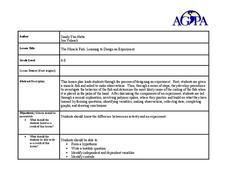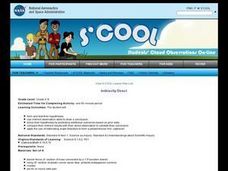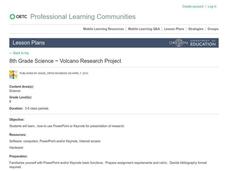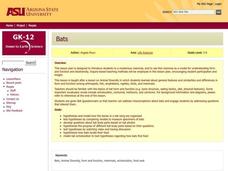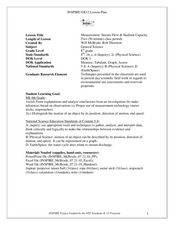Curated OER
You Can Die Here
Students examine Death Valley including the amount of precipitation and winds that it gets. In this climate based lesson students explain the reasons for the amount of precipitation and windward patterns in Death Valley.
Curated OER
The Miracle Fish: Learning to Design an Experiment
Learners develop procedures to explore the behavior of fish. In this scientific experiment lesson students from a hypothesis, write a question, identify different variables and controls in their experiment.
Curated OER
Science Activity for Grades 4 - 8
Students use the scientific method and see the relationship between explanation and evidence as they investigate the effects of violence on young viewers.
Curated OER
Scientific Inquiry
Students investigate the general geology, biology, and chemistry of Seneca Lake. They study how to use scientific instruments on the research vessel. They explain how the data they gather will be used by scientists and develop a hypothesis.
Curated OER
Off Base
Students study La Chatelier's principle and identify how carbon dioxide may affect pH. In this coral lesson students complete a worksheet on pH and observe a lab.
Curated OER
Problem Based Inquiry Learning
Tenth graders research Nuclear Energy and Radioactivity, how is this form of energy used for the good of mankind in solving the energy crisis and the hazardous aspect of using this form of energy. They cooperatively work in groups to...
Curated OER
Tee Off!
Students explore about one of the many products created by gain-based process. They investigate the ways agriculture can protect and preserve the environment. Pupils use their scientific processing skills to conduct a full inquiry based...
Curated OER
The Risks of Everyday Living
Students compare their perceptions of risk to the perceptions of scientists and risk professionals. in small groups, they evaluate risks on a scale of 1 to 10 for the average American on a yearly basis.
Curated OER
Why Garden in New York State Schools?
A lovely presentation in which slide after slide outlines the many educational, physical, emotional, and social benefits of gardening in schools. This presentation is meant to be shown to parents, and would be a terrific choice to...
Curated OER
Indirectly Direct
Learners use prior knowledge of angle and lines as they conduct an experiment with a rolling marble to determine the shape of a mystery object located under a metal pie tin.
Curated OER
Plants and Animals: Alike and Not Alike
After reading an informative paragraph that outlines some of the differences between plants and animals, fifth graders attempt to correctly categorize 12 words in a word bank. They must put them in the plant, or animal category. This...
National Library of Medicine
Your Environment, Your Health: The Great Debate—Bottled Water vs. Tap Water in Our School
Should bottled water be sold in schools, or should they only provide tap water? The summative unit in the six-part series encourages scholars debating this topic. The lessons teach how to build an argument, how to gain background...
Curated OER
Volcano Research Project
Eighth graders research about different types of volcanoes. In this earth science lesson, 8th graders create PowerPoint presentation on the information gathered. They share findings with the class.
Curated OER
The Earliest Primates
In this early primate worksheet, students will read information about the fossil evidence of the earliest primates. Students will complete 3 short answer questions based on their reading.
Curated OER
Exploring Mars
Learners, working in small groups construct scale models of the planets and solar system. They examine images of Mars and discuss what might have caused the features. They record facts about their planetary research in their journals and...
Center for Learning in Action
Gases
Explore the properties of gases through one activity and two investigations in which super scientists observe the changes gas makes when encountering different conditions.
Center for Learning in Action
Water—Changing States (Part 1)
Here is part one of a two-part lesson plan in which scholars investigate the changing states of water—liquid, solid, and gas. With grand conversation and up to three demonstrations, learners make predictions about what they think will...
Center for Learning in Action
Introduction to the States of Matter
Liquids, gases, and solids are the states of matter in which scholars investigate in a lesson plan that offers in-depth information and engaging activities that look into the three states and the changes their properties make when mixed...
Center for Learning in Action
Density
Explore the concept of density within states of matter—gases, liquids, and solids—through a group experiment in which young scientists test objects' texture, color, weight, size, and ability to sink or float.
Center for Learning in Action
Introducing Physical and Chemical Changes
Young scientists investigate chemical and physical changes to the states of matter—gas, liquid, and solid—as well as solutions and suspensions with a variety of demonstrations, grand conversation, and an interactive quiz to check for...
Center for Learning in Action
Water – Changing States (Part 2)
Here is part two of a two-part instructional activity in which scholars investigate the changing states of water—liquid, solid, and gas—and how energy from heat changes its molecules. With grand conversation, two demonstrations, and one...
Achieve
Rabbit Food
Keep your pets slim, trim, and healthy using mathematics! Pupils use a linear programming model to optimize the amount and type of food to provide to a pet rabbit. They model constraints by graphing inequalities and use them to analyze a...
Curated OER
Bats
Students model how the bones in a bat wing are organized. They develop questions about bat body parts based on photographs. They hypothesize how bats locate their food.
Curated OER
Measurement: Stream Flow & Stadium Capacity
Eighth graders study the scientific fields and how information can be monitored and recorded. For this scientific inquiry lesson students view a PowerPoint presentation and complete a hands on activity.



